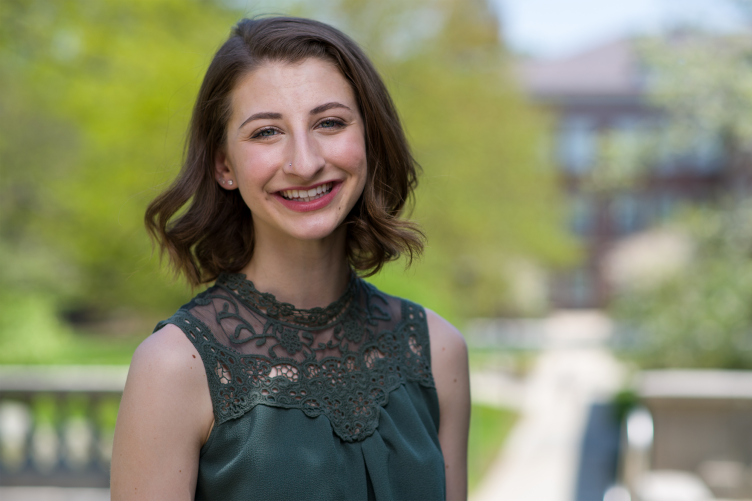
When you talk with Rachel Sabol ’17 about her scholarly work, it’s as if she’s been in bioresearch for years. Words tumble from her mouth as she describes highly scientific topics with ease.
In a sense, she has been working in bioresearch for years — three, to be exact. She entered UNH as a math major but switched to biology before her sophomore year. The move brought her into the genetics lab of assistant professor Matthew MacManes, where she got her feet wet working on ladybug genetics. For the next two years, she worked alongside assistant professor of pharmacology Brian Barth, who studies acute myeloid leukemia.
“We researched sphingolipids, a class of signaling molecules that we’re interested in because they’re involved in cell fate determination — so, cell death or cell survival,” Sabol says. “In manipulating their metabolism, we can change the fate of cells. Obviously you want the cancer cells to die, so we can push them more toward that fate using some of these sphingolipid-based therapeutics.”
“Rachel came into the lab very motivated and interested in what we were doing,” says Barth. “She was very determined, and that’s important in science, because things don’t always go as you would expect.”
For her senior thesis, Sabol examined how high-fat diets might impact the progression of a pre-leukemic disease called myelodysplastic syndrome into acute myeloid leukemia.
The research was a great fit, even if it wasn’t exactly what she had planned.
“When I decided to switch to biology, I was going to do biology teaching, but then I had a really great professor, Dr. (Charles) Walker, who helped me get involved in research. I just really love it,” Sabol says.
But the interest in teaching didn’t entirely diminish. Barth says toward the end of Sabol’s time on campus she took a mentorship role with some of the freshmen who had joined the lab.
Sabol’s Advice for First-Year Students

UNH Today asked Rachel Sabol what she would tell incoming students to help them make the most of their UNH experience. Here’s what she said.
“The biggest thing is to get involved as much as you can. There are so many opportunities here, and I think a lot of people miss out on those things because they’re nervous about doing something new. Especially when they’re first starting, it can be really difficult and scary. Start going to socials in dorms; it can be really rewarding. Once you start finding your place on campus and find something you really love doing, everything will open up for you, and you’ll be good to go after that.”
“She embraces what I embrace — the opportunity to work with young individuals and get them excited and see how they grow,” he says. “I think she’ll make an excellent professor someday.”
If the Dover, New Hampshire, native had any reservations about going to a university so close to home (she did), they vanished pretty quickly. “I’m really happy with my decision to come here; I don’t regret it at all,” she says.
And, Sabol made the most of her time off campus, as well.
During the summer before her junior year, she taught seventh grade biology in San Jose, California, as part of the Breakthrough Collaborative, which aims to help prepare students to apply to four-year universities.
Then she spent the summer before her senior year at UCLA as an Amgen education fellow, working alongside Dr. David Dawson on pancreatic cancer research.
“We looked at a whole bunch of different potential drugs for pancreatic cancer and tested them on different cell lines to see how they responded,” she says.
This summer, Sabol’s working at the National Institutes of Health in Bethesda, Maryland, as an Amgen education fellow. She’s a mentor in the HiSTEP program, which strives to encourage more high school students to become interested in the biomedical sciences. She’s teaching classes, helping the students with college applications and mentoring them on independent projects.
Soon, she’ll head to Cleveland, Ohio, to start her doctorate in the biomedical sciences training program at Case Western Reserve University’s School of Medicine. “I hope to continue my research in cancer biology there,” she says.
“I’m very, very proud of Rachel,” says Barth, adding, “The lab is better because of her.”
-
Written By:
Tracey Bentley | Communications and Public Affairs
















































